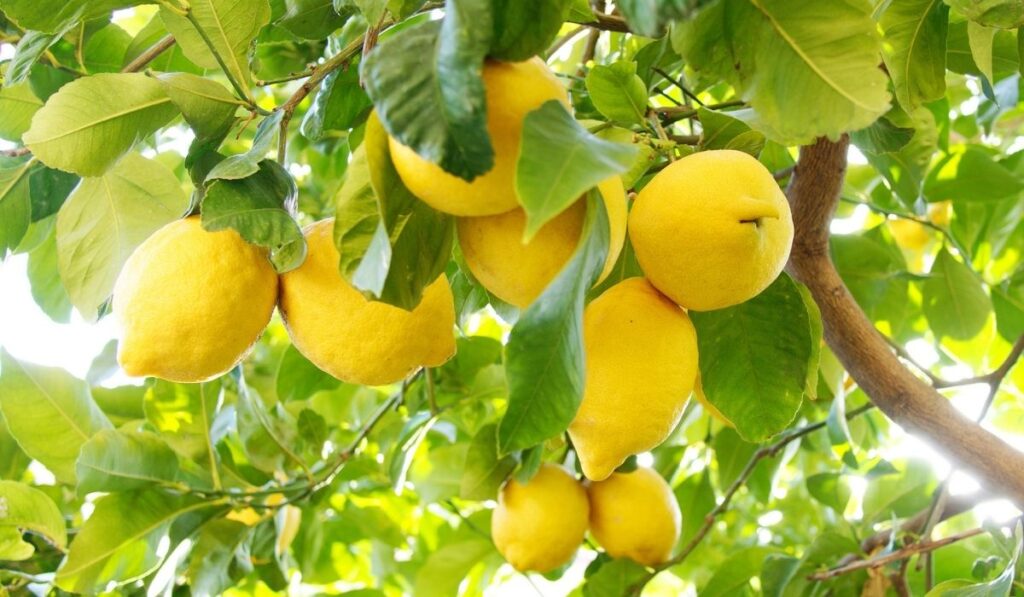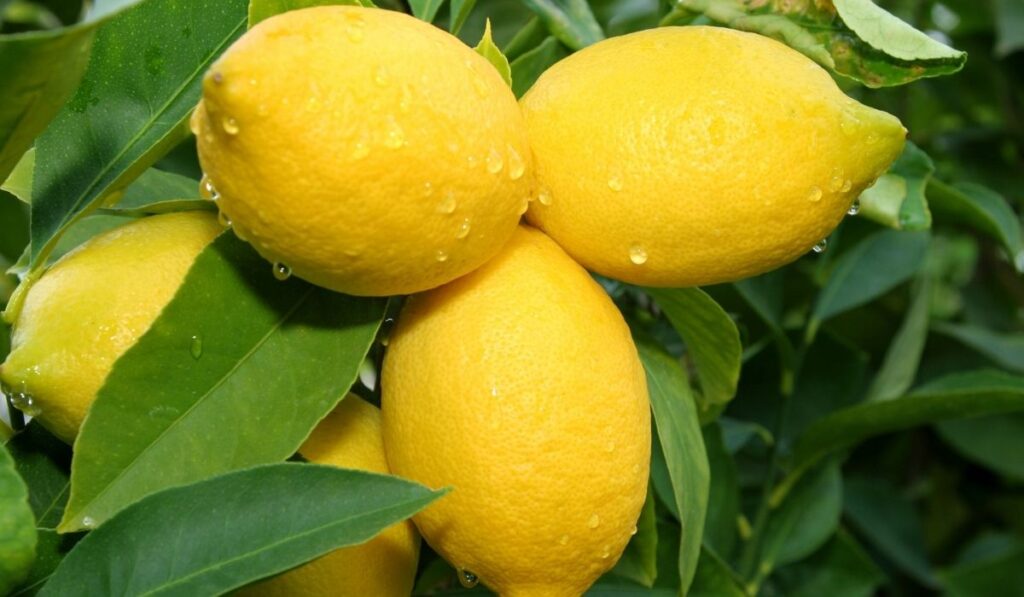Lemons are chock-full of nutrients such as vitamin C, magnesium, dietary fiber, flavonoids, antioxidant limonene, iron, and citric acid. This blend of nutrients boosts immunity, reduces the risk of heart disease and stroke, aids in digestive health, and helps with weight loss. Learning when the citrus fruits are in season and the best storage methods helps you maximize these health benefits.
There are lots of varieties of lemons, and growing patterns around the world mean you can basically get fresh lemons any time of year. They’re technically “in season” when the fruits that were produced in the cold winter months begin to ripen starting in spring, and through summer and fall.
To make the most out of lemons, let’s take a closer look at where lemons are grown, when they’re in season, the different lemon varieties, and some of the best storage methods.
What Time of Year Do Lemon Trees Produce Fruit?

Lemon trees produce fruit in the colder winter months. The fruits take anywhere from 4 months to 1 year to ripen. During the spring, the flowers blossom and the fruit develops over the warmer summer months. In the fall and early winter, the fruit matures and turns from green to yellow.
A matured green lemon is usually about 2 inches in diameter. The glossy skin of a ripe lemon ranges from green or greenish yellow to yellow, and the fruit continues to ripen after harvest. Mature fruits in a tree last there for some weeks, which extends the lemon harvesting season.
The United States is among the biggest lemon producers with California, Florida, and Arizona being the main growing areas in the country. Imports peak during the warmer months when locally available ripe fruits are more scarce.
Different varieties of lemons are in season at different times of the year. Here’s a breakdown of the seasons based on the lemon variety:
- Eureka lemons: Harvesting period is from late winter to early summer.
- Lisbon lemons: Main harvesting season is in winter/early spring.
- Bearss lemons: Harvesting season runs from July through December.
- Meyer lemons: Harvesting season is from November to March.
Most of these lemons are still available in smaller quantities throughout the year.
Lemons are also in season in different months based on the location. Here’s a breakdown of the harvesting season in different states:
- Alabama: Mid-October to mid-December
- California: January to December
- Mississippi: Mid-October to December
- Hawaii: January to February and mid-July to December
- Louisiana: January to February and mid-November to December
- Texas: January to April and September to December
- Florida: January to June and September to December
- Arizona: January to March and August to December
Whether you’re hoping to make lemon beverages, sautés, salad dressings, soups, or desserts, look out for lemons when they’re in season for the best possible results.
How Long Do Lemons Last?

The life of your lemons depends on the storage method you choose. Lemons can last anywhere from a few days after you buy them to several months, and in the off times you can still get some of that flavor and nutrients from shelf-stable options like powderd lemon, and dried lemon slices (both on Amazon).
If you buy lemons in bulk from the grocery store, you should find the best way to store them. Lemons continue to ripen and also dry out if not stored properly.
Lemons can last for up to a week on the kitchen counter. In warmer months, your lemons might go bad more quickly at room temperatures. Exposed lemons also lose their juiciness and become harder. You’ll have less juice for your beverages and the taste also changes.
Refrigerating your lemons is a simple way to extend their shelf life. If you have plans to use your lemons in baking, juices, or other recipes, storing the fruits in the fridge keeps them fresh for four to six weeks.
To refrigerate whole lemons, use an airtight container. Storing your lemons in the fridge without a container reduces the timeframe in which they’ll stay fresh. A sealed container keeps the citrus fruits fresh for any recipe you want.
For lemon slices and wedges, place them in an airtight container before storing them in the refrigerator. The cut lemons only last for a few days or up to a week. Use the cut lemons first for any recipe you wish to prepare before cutting more lemons.
To guarantee the longest storage period, pick the best lemons. Look out for any bruises, scars, or other spots. A healthy, ripe lemon has yellow skin and feels a bit soft when squeezed lightly. Don’t store your lemons together with apples. As they age, apples emit a gas that causes other fruits to ripen faster.
Do Meyers Lemons Taste Different?
Meyer lemons have a different taste from regular lemons. These lemons that are native to China have a sweeter floral taste, with less acidity. Unlike the typical lemon, Meyer lemons don’t have that characteristic sharp tang or bitter taste.
Meyer lemons get their name from Frank N. Meyer, the explorer who brought the plant to the US in the early 20th century. These lemons are rounder than typical lemons and have a thin, smooth, bright orange-yellow skin.
The unique qualities of Meyer lemons make them perfect for a variety of applications. You can use your Meyer lemons for chutney, fruit salads, candied lemon peels, marmalade, granitas, lemonade, and cocktails.
Meyer lemons aren’t widely available and mostly sell close to the growing areas. When buying these lemons, look for a brightly colored, smooth fruit that feels firm and heavy.
Did Humans Invent Lemons?
Lemons originated from East Asia, most likely in Burma or Southern China. Unlike most fruits that grew naturally in the wild, lemons are an invention of early civilizations. This citrus fruit is a cross breed of the bitter orange and the citron.
While the citron looks much like the lemon you find at a grocery store, there are unique differences, both in looks and taste. The citron has thick skin and yields little juice compared to a lemon.
Christopher Columbus brought lemon seeds to the Americas in 1493. The Spanish conquest of the region contributed to the further spread of the lemon.
With time, scientists and medics discovered the medical benefits of lemons. The fruits became popular for prevention of scurvy.
